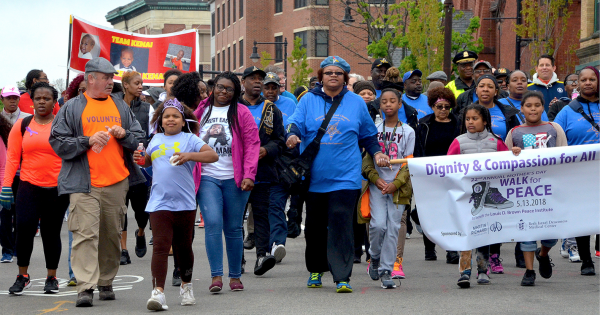May 17, 2018

The Mother's Walk for Peace made its way along Geneva Avenue on Sunday. Chris Lovett photo
Holding signs, banners, and t-shirts emblazoned with pictures of lost loved ones, more than 1,000 people rallied in Fields Corner on Sunday in support of families who have lost loved ones to violence before marching through Dorchester and Roxbury on their way to City Hall as part of the Mother’s Day Walk for Peace.
The event, now in its 22nd year, was organized by the Louis D. Brown Peace Institute as part of its continuing effort to raise money for the organization’s services, training programs, and advocacy work. The goal for Sunday was $400,000.
The Dorchester-based institute was founded by the parents of Louis D. Brown, an innocent 15 year-old boy who died after being struck by a bullet as he walked along Geneva Avenue in December 1993.
His mother, Clementina Chéry, addressed the crowd assembled in Town Field on Sunday, hailing the Institute’s success in working “to pass legislation to reform the state’s victim compensation fund so a family’s circumstances never determine their ability to pay for funeral and burial rites. You have put your faith on your feet and you have chosen to invest in peace,” she told the volunteers.
The law that Chéry noted was part of the larger criminal justice reform bill signed into law by Gov. Charlie Baker on April 13. It included amendments offered by two Dorchester legislators, then state-Sen. Senator Linda Dorcena Forry and Representative Evandro Carvalho, that expanded the number of families who can qualify to receive funds for burial costs from the state’s Victim Compensation Fund.
Previously, the attorney general’s office was required by law to deny payments to families of victims if their “acts or conduct provoked or contributed to the injuries” that led to their deaths.
In practice, the family of a victim with a criminal record was denied the compensation funding. Now, the attorney general is allowed to use his or her discretion in deciding whether or not to disperse funds to families.
In the crowd before the Walk left Fields Corner, Carvalho said that the bill “helped survivors bury their family members with dignity.”
The Peace Institute works to support families affected by violence, including offering free counseling for loved ones and helping to pay for burial costs. In a release, its noted that “225 walk teams registered and raised money to expand Peace Institute's services, training, and advocacy work.”
The make-up of these teams varied from families honoring the memories of their loved ones, to local church groups, to community allies wishing to show their support.
From the stage in Fields Corner, Elisha Ross, whose son Michael was murdered on March 30 in Dorchester, said that she was “walking with the hope that one day no mother, father, or family will have to suffer the loss of a child.”
“Today, I choose to allow love and forgiveness to rule the moment,” she said. “It's where I find my most inner peace and strength in the midst of my pain. I choose to take control rather than be controlled. The love I have for Michael, along with my memories of him, will live forever."
As the march moved past Madison Park High School in Roxbury, three young hip-hop artists from East Boston – Abraham Caban, a.k.a. MC Abe; Chad Williams, a.k.a. Jack the Reaper; and Kamari Jones, a.k.a. Junior Biggie – shared verses about their lives.
Jones said one way to stay safe is to lead a positive life — although that's not a guarantee. "If you want to indulge into something that's dangerous, you're going to get a dangerous outcome. If you want to indulge into something that's good, you're going to get a better outcome. But sometimes,” he said, “you could be at a wrong place, wrong time, and something happens."
For Caban, the answer to his anxiety over violence is in hip-hop.
"I live in Eastie... and I've heard about stabbings near my house and everything, and I try to take what I feel, and I try to put it into my music,” he said, “because my emotions speak my words.”
Added Boston Police Superintendent-in-Chief William Gross when he took a moment from chatting with peace marchers, "when we work together we truly can stop evil.”
Some of those who walked are parents of victims whose killers remain at large. Federico Brown, a father of five, lost one of them, 27-year-old Brandon, to a murderer in Dorchester in July 2016. With the second anniversary coming up soon, Brown is still waiting for answers. "It could’ve been solved in three days, but unfortunately it hasn’t been," he said.
Asked if he is still hoping for an arrest, he said: "Oh, definitely. … It would mean getting a bad apple off the street before he does it again."
Brown marched with his wife, Monica Haney Brown, and a picture of Brandon while thinking about how to root out the violence that plagues the city. The challenges are many — but they said there's a simple place to start. "It's got to start at home," Monica Brown said, adding, "People see their kids doing certain things and they’re not paying attention to them. Look around for the gun in your child’s house. Care about what he’s doing, ask questions, don’t be afraid of him. When you’re afraid of your child, there’s a problem."
Simón Rios, a reporter for WBUR, contributed to this report.
Topics:


